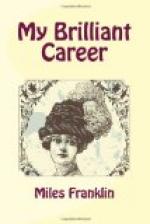I was sitting on a chair in the veranda sewing; he, with his head on a cushion, was comfortably stretched on a rug on the floor.
“Uncle Boss, why can’t something be done for tramps?”
“How done for ’em?”
“Couldn’t some means of employing them be arrived at?”
“Work!” he ejaculated. “That’s the very thing the crawling divils are terrified they might get.”
“Yes; but couldn’t some law be made to help them?”
“A law to make me cut up Caddagat and give ten of ’em each a piece, and go on the wallaby myself, I suppose?”
“No, uncle; but there was a poor young fellow here this morning who, I feel sure, was in earnest when he asked for work.”
“Helen!” bawled uncle Jay-Jay.
“Well, what is it?” she inquired, appearing in the doorway.
“Next time Sybylla is giving a tramp some tucker, you keep a sharp eye on her or she will be sloping one of these days. There was a young fellow here today with a scarlet moustache and green eyes, and she’s dean gone on him, and has been bullying me to give him half Caddagat.”
“What a disgusting thing to say! Uncle, you ought to be ashamed of yourself,” I exclaimed.
“Very well, I’ll be careful,” said aunt Helen, departing.
“What with the damned flies, and the tramps, and a pesky thing called Sybylla, a man’s life ain’t worth a penny to him,” said uncle.
We fell into silence, which was broken presently by a dirty red-bearded face appearing over the garden gate, and a man’s voice:
“Good day, boss! Give us a chew of tobaccer?”
“I’m not the boss,” said uncle with assumed fierceness.
“Then who is?” inquired the man.
Uncle pointed his thumb at me, and, rolling out on the floor again as though very sleepy, began to snore. The tramp grinned, and made his request of me. I took him round to the back, served him with flour, beef, and an inch or two of rank tobacco out of a keg which had been bought for the purpose. Refusing a drink of milk which I offered, he resumed his endless tramp with a “So long, little missy. God bless your pleasant face.”
I watched him out of sight. One of my brothers—one of God’s children under the Southern Cross. Did these old fellows really believe in the God whose name they mentioned so glibly? I wondered. But I am thankful that while at Caddagat it was only rarely that my old top-heavy thoughts troubled me. Life was so pleasant that I was content merely to be young—a chit in the first flush of teens, health, hope, happiness, youth—a heedless creature recking not for the morrow.
CHAPTER FIFTEEN
When the Heart is Young
About a week or so after I first met Harold Beecham, aunt I V Helen allowed me to read a letter she had received from the elder of the two Misses Beecham. It ran as follows:




